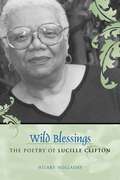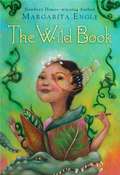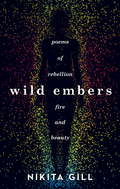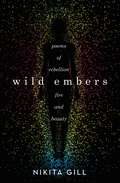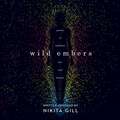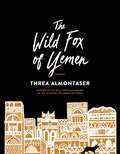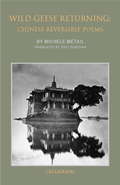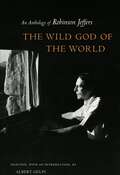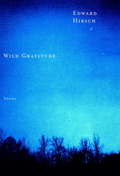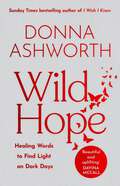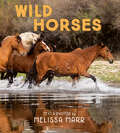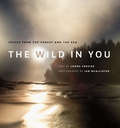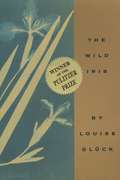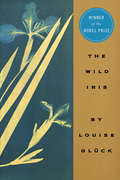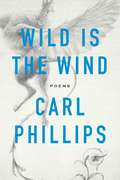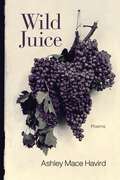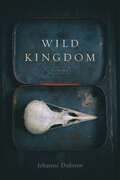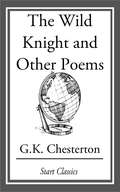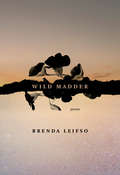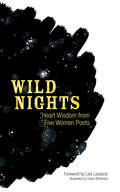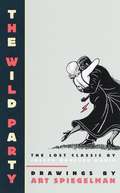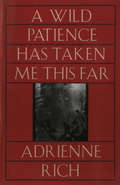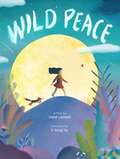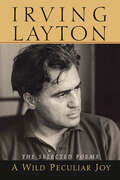- Table View
- List View
Wild Blessings: The Poetry of Lucille Clifton (Southern Literary Studies)
by Hilary HolladayWidely acclaimed for her powerful explorations of race, womanhood, spirituality, and mortality, poet Lucille Clifton has published thirteen volumes of poems since 1969 and has received numerous accolades for her work, including the 2000 National Book Award for Blessing the Boats. Her verse is featured in almost every anthology of contemporary poetry, and her readings draw large and enthusiastic audiences. Although Clifton's poetry is a pleasure to read, it is neither as simple nor as blithely celebratory as readers sometimes assume. The bursts of joy found in her polished, elegant lines are frequently set against a backdrop of regret and sorrow. Alternately consoling, stimulating, and emotionally devastating, Clifton's poems are unforgettable. In Wild Blessings, Hilary Holladay offers the first full-length study of Clifton's poetry, drawing on a broad knowledge of the American poetic tradition and African American poetry in particular. Holladay places Clifton's poems in multiple contexts -- personal, political, and literary -- as she explicates major themes and analyzes specific works: Clifton's poems about womanhood, a central concern throughout her career; her fertility poems, which are provocatively compared with Sylvia Plath's poems on the same subject; her relation to the Black Arts Movement and to other black female poets, such as Gwendolyn Brooks and Sonia Sanchez; her biblical poems; her elegies; and her poignant family history, Generations, an extended prose poem. In addition to a new preface written after Clifton's death in 2010, this updated edition includes an epilogue that discusses the poetry collections she published after 2004.Readers encountering Lucille Clifton's poems for the first time and those long familiar with her distinctive voice will benefit from Hilary Holladay's striking insights and her illuminating interview with the influential American poet.
The Wild Book
by Margarita EngleFefa struggles with words. She has word blindness, or dyslexia, and the doctor says she will never read or write. Every time she tries, the letters jumble and spill off the page, leaping and hopping away like bullfrogs. How will she ever understand them? But her mother has an idea. She gives Fefa a blank book filled with clean white pages. "Think of it as a garden," she says. Soon Fefa starts to sprinkle words across the pages of her wild book. She lets her words sprout like seedlings, shaky at first, then growing stronger and surer with each new day. And when her family is threatened, it is what Fefa has learned from her wild book that saves them.
Wild Critters
by Tim JonesPhotography of Alaskan wildlife is accompanied by humorous verses about the animals.
Wild Embers: Poems of rebellion, fire and beauty
by Nikita Gill'You cannot burn awayWhat has always been aflame'WILD EMBERS explores the fire that lies within every soul, weaving words around ideas of feeling at home in your own skin, allowing yourself to heal and learning to embrace your uniqueness with love from the universe. Featuring rewritten fairytale heroines, goddess wisdom and poetry that burns with revolution, this collection is an explosion of femininity, empowerment and personal growth.
Wild Embers: Poems Of Rebellion, Fire, And Beauty
by Nikita Gill"You cannot burn awayWhat has always been aflame"Wild Embers explores the fire that lies within every soul, weaving words around ideas of feeling at home in your own skin, allowing yourself to heal, and learning to embrace your uniqueness with love from the universe. Featuring rewritten fairytale heroines, goddess wisdom, and poetry that burns with revolution, this collection is an explosion of femininity, empowerment, and personal growth.
Wild Embers: Poems of rebellion, fire and beauty
by Nikita Gill"They have lightning in their souls, thunder in their hearts, chaos in their bones."Nikita Gill's poetry has captured hearts and minds all over the world; her inspirational words have been shared hundreds of thousands of times online, been plastered across placards on international women's marches and even transformed into tattoos. This collection will showcase mostly unseen poetry and prose, delving into ideas about passion, identity, empowerment and femininity.Written and Read by Nikita Gill(p) 2017 Orion Publishing Group
The Wild Fox of Yemen: Poems
by Threa AlmontaserLonglisted for the National Book Award for PoetryWinner of the Walt Whitman Award of the Academy of American Poets, selected by Harryette MullenBy turns aggressively reckless and fiercely protective, always guided by faith and ancestry, Threa Almontaser’s incendiary debut asks how mistranslation can be a form of self-knowledge and survival. A love letter to the country and people of Yemen, a portrait of young Muslim womanhood in New York after 9/11, and an extraordinarily composed examination of what it means to carry in the body the echoes of what came before, Almontaser’s polyvocal collection sneaks artifacts to and from worlds, repurposing language and adapting to the space between cultures. Half-crunk and hungry, speakers move with the force of what cannot be contained by the limits of the American imagination, and instead invest in troublemaking and trickery, navigate imperial violence across multiple accents and anthems, and apply gang signs in henna, utilizing any means necessary to form a semblance of home. In doing so, The Wild Fox of Yemen fearlessly rides the tension between carnality and tenderness in the unruly human spirit.
Wild Geese Returning: Chinese Reversible Poems
by Jeffrey Yang Jody Gladding Michele MetailA breathtaking introduction to Chinese multidirectional poems, told through the story of Su Hui, the greatest writer of these poems who embroidered a silk with 840 characters--equaling as many as 12,000 multidirectional poems--for her distant husband.For nearly two thousand years, the condensed language of classical Chinese has offered the possibility of writing poems that may be read both forward and backward, producing entirely different creations. The genre was known as the “flight of wild geese,” and the poems were often symbolically or literally sent to a distant lover, in the hope that he or she, like the migrating birds, would return. Its greatest practitioner, and the focus of this critical anthology, is Su Hui, a woman who, in the fourth century, embroidered a silk for her distant husband consisting of a grid of 840 characters. No one has ever fully explored all of its possibilities, but it is estimated that the poem—and the poems within the poem—may be read as many as twelve thousand ways. Su Hui herself said, “As it lingers aimlessly, twisting and turning, it takes on a pattern of its own. No one but my beloved can be sure of comprehending it.” With examples ranging from the third to the nineteenth centuries, Michèle Métail brings the scholarship of a Sinologist and the playfulness of an avant-gardist to this unique collection of perhaps the most ancient of experimental poems.
The Wild God of the World: An Anthology of Robinson Jeffers
by Robinson Jeffers&“The forgotten giant of American poetry . . . For those who would discover Jeffers . . . this is the place to start—and a place to return again and again.&” —Tim Hunt, Washington State University Robinson Jeffers (1887-1962) is not only the greatest poet that the American West has produced but also a major poet of the twentieth century in the tradition of American prophetic poetry. This anthology serves as an introduction to Jeffers&’s work for the general reader and for students in courses on American poetry. Jeffers composed each volume of his verse around one or two long narrative or dramatic poems. The Wild God of the World follows this practice: in it, Cawdor, one of Jeffers&’s most powerful narratives, is surrounded by a representative selection of shorter poems. At the end of the book, the editor has provided revealing statements about Jeffers&’s poetry and poetics, and about his philosophy of nature and human nature. &“Of all the poets of his generation, [Robinson Jeffers] made our relation to this earth and sea and sky and wheeling seasons and the evolutionary processes that made trees and salmon runs and hunting hawks, his subject. As that relation grows more troubled, his words become more necessary. To have this beautifully edited and freshly seen anthology is a gift.&” —Robert Hass, University of California, Berkeley
Wild Gratitude
by Edward HirschAn excerpt from the poem, Wild Gratitude: "Tonight when I knelt down next to our cat, Zooey, And put my fingers into her clean cat's mouth, And rubbed her swollen belly that will never know kittens, And watched her wriggle onto her side, pawing the air, And listened to her solemn little squeals of delight, I was thinking about the poet, Christopher Smart, Who wanted to kneel down and pray without ceasing In everyone of the splintered London streets, And was locked away in the madhouse at St. Luke's With his sad religious mania, and his wild gratitude, And his grave prayers for the other lunatics, And his great love for his speckled cat, Jeoffry. All day today--August 13, 1983--I remembered how Christopher Smart blessed this same day in August, 1759, For its calm bravery and ordinary good conscience."
Wild Hope: Healing Words to Find Light on Dark Days
by Donna AshworthFind Hope and Solace in Inspirational Poetry from Scotland’s Poet Sensation and Sunday Times Bestselling Author“Beautiful and uplifting” —Davina McCall“So inspiring, so heartfelt ... the way Donna writes is beyond beautiful.” —Lisa Snowdon#1 Best Seller in Love Poetry, Poetry by Women, and Emotional Self HelpWild Hope is Donna Ashworth’s powerful new collection of wisdom to help us find comfort, hope, peace, self-acceptance, and inspiration when we feel worn down, helpless, or sad.Find solace in Ashworth's eloquent verse. Through contemporary poetry, Donna explores the human condition. This inspiring poetry collection brings comfort and guidance, offering a lifeline to those battling anxiety, depression, or merely the strain of a demanding career. Hope exists when nothing else can. Wild Hope helps you find light on the darkest days.Unlock the power of kindness and hope. Ashworth underscores the impact of acts of love and kindness in shaping a better future, reminding readers of the innate goodness of humanity. Through her heartfelt work, you are guided towards emotional healing, enhancing your mental well-being, and fostering an atmosphere of positive thinking.Mental health poetry. Written with love and understanding, Donna reminds us that amidst our daily struggles and constant outpourings of bad news, we have so much to hope for and that every one of us can play a part, big or small, in making the world a better place.In Wild Hope discover: A reservoir of inspirational poetry Empowering wisdom and practical guidanceStrategies to cultivate self-love and self-acceptanceThe powerful role of acts of kindness and love in creating a better futureIf you liked books such as Milk and Honey, Healing Words, The Sun and Her Flowers, or Good Grief, you'll love Wild Hope. Also don’t miss Donna’s other bestselling inspirational poetry works, I Wish I Knew, Loss, Life, and Love.
Wild Horses
by Melissa MarrGorgeous photographs and an evocative text sing the praises of a real-life herd of wild horses running free in Arizona, in this ode to the beauty of these glorious creatures. Between one breath and the next, / the Wild Horses appear.Gliding through trees, / weaving between cactus and rock. In beautiful poetry and vivid photographs, Melissa Marr shares her feelings of awe while watching a real-life herd of majestic wild horses in Arizona. When they appear, the wind itself seems to stand still. They are grand in their movements as they do all the things horses do--splash through rivers, care for young, stomp and whinny. It is clear they are not tame, and this is part of their beauty and power. How lucky are we to be able to witness their strength and speed and magnificence!
The Wild in You
by Lorna Crozier Ian McallisterA testament to the miraculous beings that share our planet and the places that they live, The Wild in You is a deeply-felt creative collaboration between one of our time's best nature photographers and a very talented and creative poet. Inspired by the majestic and savage beauty of Ian McAllister's photographs, Lorna Crozier translates the wild emotion of these images into the language of the human heart: poetry. Featuring over 30 beautiful full-size photographs of wolves, bears, sea lions, jellyfish, and other wild creatures paired with 30 original poems, The Wild in You challenges the reader to a deeper understanding of the connection between humans, animals, and our shared earth.
The Wild Iris
by Louise GlückThis collection of stunningly beautiful poems encompasses the natural, human, and spiritual realms, and is bound together by the universal themes of time and mortality. With clarity and sureness of craft, Gluck's poetry questions, explores, and finally celebrates the ordeal of being alive. <P><P> Pulitzer Prize Winner
The Wild Iris
by Louise GluckThis collection of stunningly beautiful poems encompasses the natural, human, and spiritual realms, and is bound together by the universal themes of time and mortality. With clarity and sureness of craft, Gluck's poetry questions, explores, and finally celebrates the ordeal of being alive.
Wild Is the Wind: Poems
by Carl PhillipsA powerful, inventive collection from one of America's most critically admired poets“What has restlessness been for?” In Wild Is the Wind, Carl Phillips reflects on love as depicted in the jazz standard for which the book is named—love at once restless, reckless, and yet desired for its potential to bring stability. In the process, he pitches estrangement against communion, examines the past as history versus the past as memory, and reflects on the past’s capacity both to teach and to mislead us—also to make us hesitate in the face of love, given the loss and damage that are, often enough, love’s fallout. How “to say no to despair”? How to take perhaps that greatest risk, the risk of believing in what offers no guarantee? These poems that, in their wedding of the philosophical, meditative, and lyric modes, mark a new stage in Phillips’s remarkable work, stand as further proof that “if Carl Phillips had not come onto the scene, we would have needed to invent him. His idiosyncratic style, his innovative method, and his unique voice are essential steps in the evolution of the craft” (Judith Kitchen, The Georgia Review).
Wild Juice: Poems (Southern Messenger Poets)
by Ashley Mace HavirdIn Wild Juice, the poet and novelist Ashley Mace Havird confronts global and personal change. Her subjects range from the extinction of a prehuman species to the present-day reduction in sea life due to the climate crisis. Closer to home, she confronts the death of her father and her own aging. Running throughout these lyrics of loss is the richness of communal life, a current of hope given substance by the juice of wild grapes that baptizes the poet’s chin and that of her elderly father, whose presence haunts the book. Havird’s poems move from sea coasts to the rural South to landlocked suburbia, in language characterized by wit, pluck, and ironic candor. Through striking evocations of the natural world, conveyed in a voice steeped in mature human experience, Wild Juice speaks memorably on behalf of a life that embraces us all.
Wild Kingdom: Poems
by Jehanne DubrowWild Kingdom explores the world of academia, examining this strange landscape populated by faculty, administrators, and students. Using what she calls “received academic forms,” Jehanne Dubrow crafts poems that recall the language of academic documents such as syllabi, grading rubrics, and departmental minutes. “Honor Board Hearing,” a series of prose poems, depicts challenges frequently faced by undergraduates, offering fictionalized accounts of cases involving plagiarism, theft, sexual assault, and substance abuse.As a rejoinder to the famous dictum that “academic politics is the most vicious and bitter form of politics, because the stakes are so low,” Dubrow maintains that, given the current moment, the stakes could not be higher. Even as it acknowledges the cruelty that exists within the academy, Wild Kingdom asks how scholars and educators can work to ensure that institutions of higher learning continue to nurture students and remain places of rigorous critical thinking.
The Wild Knight and Other Poems
by G. K. ChestertonBorn in London, Chesterton was educated at St. Paul's, but never went to college. He went to art school. In 1900, he was asked to contribute a few magazine articles on art criticism, and went on to become one of the most prolific writers of all time. He wrote a hundred books, contributions to 200 more, hundreds of poems, including the epic Ballad of the White Horse, five plays, five novels, and some two hundred short stories, including a popular series featuring the priest-detective, Father Brown. In spite of his literary accomplishments, he considered himself primarily a journalist. He wrote over 4000 newspaper essays, including 30 years worth of weekly columns for the Illustrated London News, and 13 years of weekly columns for the Daily News. He also edited his own newspaper, G.K.'s Weekly. (To put it into perspective, four thousand essays is the equivalent of writing an essay a day, every day, for 11 years. If you're not impressed, try it some time. But they have to be good essays, all of them, as funny as they are serious, and as readable and rewarding a century after you've written them.) Chesterton was equally at ease with literary and social criticism, history, politics, economics, philosophy, and theology. His style is unmistakable, always marked by humility, consistency, paradox, wit, and wonder. His writing remains as timely and as timeless today as when it first appeared, even though much of it was published in throw away paper. This man who composed such profound and perfect lines as "The Christian ideal has not been tried and found wanting; it has been found difficult and left untried," stood 6'4" and weighed about 300 pounds, usually had a cigar in his mouth, and walked around wearing a cape and a crumpled hat, tiny glasses pinched to the end of his nose, swordstick in hand, laughter blowing through his moustache. And usually had no idea where or when his next appointment was. He did much of his writing in train stations, since he usually missed the train he was supposed to catch. In one famous anecdote, he wired his wife, saying, "Am at Market Harborough. Where ought I to be?" His faithful wife, Frances, attended to all the details of his life, since he continually proved he had no way of doing it himself. She was later assisted by a secretary, Dorothy Collins, who became the couple's surrogate daughter, and went on to become the writer's literary executrix, continuing to make his work available after his death. This absent-minded, overgrown elf of a man, who laughed at his own jokes and amused children at birthday parties by catching buns in his mouth, was the man who wrote a book called The Everlasting Man, which led a young atheist named C.S. Lewis to become a Christian. This was the man who wrote a novel called The Napoleon of Notting Hill, which inspired Michael Collins to lead a movement for Irish Independence. This was the man who wrote an essay in the Illustrated London News that inspired Mahatma Gandhi to lead a movement to end British colonial rule in India. This was a man who, when commissioned to write a book on St. Thomas Aquinas (aptly titled Saint Thomas Aquinas), had his secretary check out a stack of books on St.
Wild Madder
by Brenda LeifsoPoems that stride bravely into the day-to-day, recovering the misdirected intensity at its core. Brenda Leifso’s Wild Madder is about way-finding—through those moments in which you no longer recognize where you are. It’s about not knowing—who you are anymore, how to be in the world, how to love. It’s about what’s unspoken and about what speaks—conversation with the wild and animate world. It’s about marriage, family, motherhood—the drudgery in them and the quiet beauty. This is lyric poetry wracked with pain, rage, and longing. In the beginning, the collection may read as though it’s been steeped in bitterness. Family can ask everything of a partner and parent and then turn around and take even more; Wild Madder feels like a note in a bottle washed up on the shores of a rough sea. But Leifso is not one to stand still or cling to darkness; in fact, we end up so far into the darkness that when she breaks through into light, it’s a conflagration of all the things that make us human. These frank, bracingly recognizable poems will be irresistible—and cathartic—for anyone who has ever felt their life chewing them into little pieces.
Wild Nights: Heart Wisdom from Five Women Poets
by Emily Dickinson Amy Lowell Sara Teasdale Sappho Edna St. Millay Lisa Locascio Claire WhitmoreIn this soul-stirring collection of timeless verse, five legendary female poets address life's pains and sorrows as well as its joys and renewals. The poems appeal to the heart, providing companionship on the rugged path that all must tread. The roster features writers from ancient to modern times: Sappho, Emily Dickinson, Amy Lowell, Sara Teasdale, and Edna St. Vincent Millay. As instapoets continue to make poetry more accessible and popular, they build on the tradition of intimate, confessional works built by earlier generations. No one is more prominent at this heritage than the mysterious, evocative fragments of Sappho, which inspired an earlier generation of female poets to let loose their own talent. From idiosyncratic Dickinson to the passionate, Pulitzer Prize–winning Lowell, the romanticism of Teasdale, and the intense art of St. Vincent Millay — yet another Pulitzer winner — these writers were early trailblazers in speaking their emotional truth through their craft. This handsome volume features original illustrations by Claire Whitmore, a Foreword by poet and novelist Lisa Locascio, and brief biographies of all five poets.
The Wild Party: The Lost Classic
by Joseph Moncure March"The Wild Party" is a raw, funny, tragic narrative poem about a couple working in Vaudeville, Queenie and Burrs, who decide to throw a party in their New York apartment in the 1920's. She is a beautiful dancer who has known many men; he, a successful clown who has charmed many women but who is also violent and mean. Their relationship is volatile, passionate and dangerous to them both. The poem introduces us to many characters, some innocent but looking for action, some jaded, some brutal. Queenie decides to use one guest, the handsome newcomer Black, to make Burrs jealous, albeit Black arrived with Queenie's friend Kate. As the party becomes progressively more chaotic and orgiastic, the love triangle intensifies beyond Queenie's own expectation, until tragedy occurs.
A Wild Patience Has Taken Me This Far: Poems 1978-1981
by Adrienne Rich"We are in the presence here of a major American poet whose voice at mid-century in her own life is increasingly marked by moral passion."--New York Times Book Review
Wild Peace
by Irene LathamWild Peace by Irene Latham and Il Sung Na is a lush, soothing mindfulness picture book about finding solace in the natural world.With lyrical text and whimsical art, Wild Peace follows a girl whose imagination helps her escape her frenzied home and discover the joys of nature. After enjoying the serenity of the forest, she is finally ready to return to her family, where peace welcomes all that is wild, and kisses the forehead of every child.When the world fills with noise and fury,and the days pass, all rush and scurry,it's time to step into the forest . . .
A Wild Peculiar Joy: The Selected Poems
by Irving LaytonA Wild Peculiar Joy is Irving Layton's poetic testament. Hailed as the great lyric poet, Irving Layton has come to be known as one of Canada's most powerful, groundbreaking voices, an important and influential writer whose distinguished career spanned almost forty-five years. By turns passionate and grave, joyous and apocalyptic, his beautifully crafted poems are illuminated by a strong social and political conscience, and an intensely humanistic view of the world. This is poetry that is timeless and universal. Drawn from his entire body of work, and now reissued in this handsomely redesigned volume, this edition includes a new introduction by Sam Solecki, and selected short excerpts from Irving Layton's writings on the craft of poetry. A Wild Peculiar Joy once again makes available to readers the poetry of Irving Layton and stands as the author's definitive selected.
